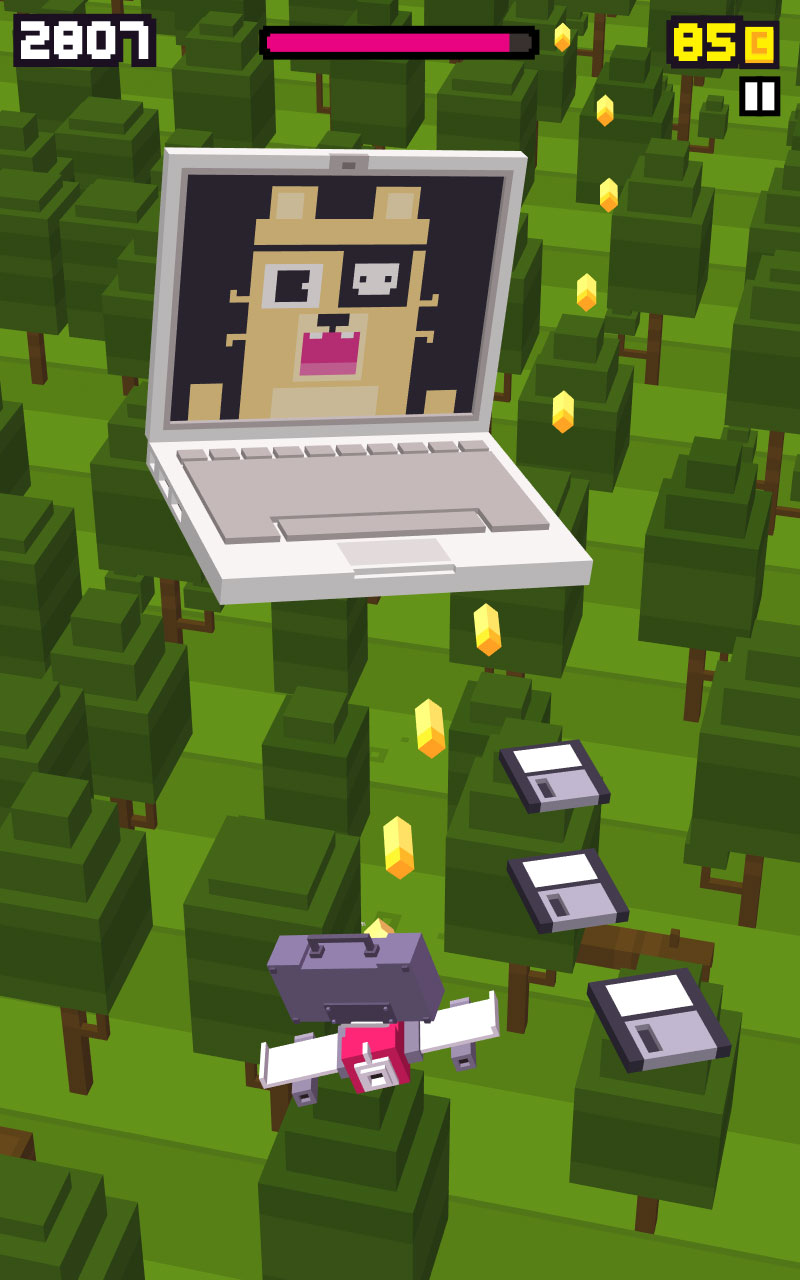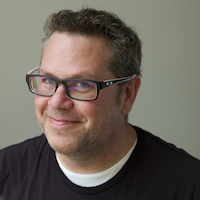
Featured Blog | This community-written post highlights the best of what the game industry has to offer. Read more like it on the Game Developer Blogs or learn how to Submit Your Own Blog Post
Internal game jams: Can you make them work for your studio?
This week Mighty Games launches Questy Quest, the first complete game to come from our fortnightly internal game jam. If you’ve wondered whether an internal game jam would work for your studio, read on and learn from our experiences...

So you’ve heard of internal game jams, and you’re maybe wondering if it would be a good idea for your development studio to start doing it. I am one of the co-founders of Mighty Games Group, a small-ish studio in Melbourne, Australia, and we’ve been running our own internal game-jam-and-pitching day every two weeks for almost a year. This article is a summary of what we’ve learned so far.

Mighty Games is a Melbourne-based studio specialising in quirky mobile games.
Introducing MondayMondayMonday!
The idea of an internal “game jam” – a time for everyone in a team to develop their own ideas and put together designs, prototypes, and pitches – isn’t new. Tim Schafer’s Double Fine has their Amnesia Fortnight, a two week jam where the entire studio is encouraged to work on original game concepts and pitch them to the rest of the team. Other studios, even some outside the game industry, do similar things in the name of creativity.
We call ours “MondayMondayMonday”, one Monday every two weeks for the whole Mighty crew to set aside their regular work so they can brainstorm and tinker with original games. It’s fairly free and open, but we have some loose rules. Mighty Games was founded to do interesting and original things with free-to-play mobile games, so that’s where we ask our staff to aim: playable on a touchscreen, and functional under the free-to-play business model. Apart from that, they can go wild.
It wasn’t just our production staff, either. Sure, our programmers and artists tend to team up and build working prototypes, but our non-techy staff are invited to join in as well. They might come up with game ideas, build prototypes out of paper, write up mini design documents – anything and everything is encouraged!
Our first MMM was nearly a year ago now. I don’t remember who initially suggested it as something we could start doing, but I know Matt Ditton, one of our co-founders, agreed with me pretty quickly that it was a good fit for Mighty. When we then brought the idea to the whole team, it was an easy sell. They were all pretty keen to give it a go.
The plan from the beginning was to have MMM be a crucible for ideas that would eventually make it to production, but it took a few months before we managed to get a formal pitch process in place. The first few months of MMMs were pretty open-ended, just coming up with game concepts without the pitching stage. We finally set up a more formalized “pitch your idea to the team” structure, in the form of a template document that I call the “pitch deck”.

Mighty’s previous game Shooty Skies was used as the template for game pitches.
I created a demo pitch for Mighty’s previous release Shooty Skies, acting as if it were a new prototype that I was pitching to the team. This was the first ever MMM pitch, mostly just so that people could see the sorts of assumptions we made when we started Shooty, and how much it changed over its development. Funnily enough, the second MMM pitch ever was for a game called Stabby Medieval Europe which would eventually become our latest release.
Shooty was a good game to base our first pitch on with because that project did not go at all how we’d originally planned. That made it a good touchstone to illustrate how the game in your head when you pitch it will hardly resemble what eventually ships.
The pitch deck we made is just five slides to showcase the game’s central design ideas, show off some concept art, suggest additional features that could be added, estimate how long it would take to refine it into a releasable commercial product, who the target market is, and all those other fundamental questions. It’s a basic but broad overview of what we need to know before we commit to a project.
I really think the value of this simple pitch deck can't be overstated. It is basically the list of vital questions that need to be answered for a game to be considered for further production. When Mighty team members sit down to fill it out for their prototype pitch, they start to see the various decision points and compromises that we have to make to really be able to ship a game. When you have your own specialized job in a team, you don’t often get a chance to think about these big picture questions.
Because of that, it’s been hugely helpful in giving the team a broader perspective on the sorts of things that make for a successful Mighty title and also the sorts of things that we’re looking at when we make tough calls about our game designs, or when we have make that painful decision to kill a project that just hasn't come together the way we wanted it to.
Why do we jam?
Setting aside a whole day every two weeks is a non-trivial chunk of our resources – it is literally 10% of our staffing budget. That’s a lot to invest in something like this, so you will no doubt be wondering what’s in it for us.
There are actually a lot of benefits, some of them pretty obvious and others a bit more subtle. The most obvious one is that we’re generating a lot of interesting game ideas, and many of them are viable candidates to be developed into complete games. We are releasing our first MMM graduate this week, a fun little timing-based action adventure game with the very tongue-in-cheek title of Questy Quest, but we have several more at various stages of development.

Questy Quest is the first “graduate” of Mighty’s internal game jam.
At any given time Mighty has a couple of prototype projects in the pipeline – if we don’t have something that’s at least halfway done when we’re shipping our current title, I get a little antsy. The market is moving so quickly, if we are not constantly looking ahead I feel like we are constantly falling behind. The other companies that we share space with at The Arcade are tired of me always asking them “So, what’s next?”
If you wait until your game is done before thinking about your next project, you'll have a hard time. It is not just about getting to market quickly and shipping tons of games, it is also about maintaining momentum. I’ve seen so many teams work so hard on their game for so long and as soon as they ship the release version, they end up burnt out and aimless. That initial release is rarely the end of a project these days, but at least having another game to work on is like a salve for your exhausted team.
It is also fantastic for our staff, in a lot of different ways. On the simplest level, they know they’ll regularly get a break from whatever they’re working on, and that’s great for their morale and energy levels. People get into a rut, especially in tech companies, working on the same stuff for eighteen months or more. For instance: If you’re the person who focuses on new character generation and implementation it can become a real grind, especially when you consider that a lot of our games have regular content updates. Shooty Skies, for example, has ten new characters every month or so, plus new missions and other content, so the team on that game are doing the same kind of thing over and over for months at a time. If they know they get a day off every couple of weeks to just have fun and work on their own original ideas, it helps them not to get burnt out.
“It’s definitely energised the place. Sometimes there’ll be conversations during the week and people will say, ooh, maybe I’ll work on that for my next prototype. We’ve always been a very upbeat company with a good working atmosphere, but MondayMondayMonday has really increased that. We can have fun working on something that we know will never see the light of day, but we also know that we can take the nugget of that prototype and maybe turn it into a full-blown product that’s part of the Mighty brand. You’ve learned something but also had fun.” - Scott Beca, Senior Programmer at Mighty and creator of Questy Quest
Our team also benefits from a wealth of new experience. Most of our crew have specific jobs to do, they’re a specific link in the long chain of stuff that needs to get done for a game to be developed. When you’re in your own little world, where you get your tasks and deliver your work, you miss out on seeing the big picture of how the games are made. MMM gives everyone a window into the parts of the production cycle they wouldn't normally be involved with. We have artists and programmers who are getting the chance to be there at the start of a project and take on a lead role, and they are getting new professional experience and building up skills in a safe and supported space that they would otherwise never be exposed to.
Another effect of having everyone working on their own projects is that our team gets divided up. We aren’t a huge studio (currently we have about 20 people) but we’re still divided up into sub-teams. There are people working on Disney Crossy Road, on Charming Runes, Shooty Skies, and of course the Questy Quest team, and it can get pretty siloed. MMM gives our people the ability to collaborate directly with other team members that they wouldn’t normally get to work with, and that makes us a stronger team. Everyone gets to see first-hand what everyone else’s skills are, and it brings us closer together as a unified group.
Questy Quest began its life as Scott Beca’s prototype Stabby Medieval Europe.
“Once I had the idea for what would eventually become Questy Quest, I asked our artist Leonie Yue to create art for it. We hadn’t really worked together before, so it was great to see her work up close and it gave me a much greater appreciation for just how good she is. She made some adorable art for the prototype, and I did the design and code and then put together the pitch. When we went into full production we decided to use Scott Bartlett’s established Charming art style to save time, so I got to work directly with him, as well as Ben Kosmina on the design, Ryan Keable on the VFX, and Jacek Tuschewski on the sound.” - Scott Beca
More than anything, though, our internal game jam means that we’re tapping into the creativity of the entire team, not just me. Our first three games – Shooty Skies, Charming Keep, and Charming Runes – were all based on my prototypes, because I’m the boss and I can just take a week off or spend a few weekends prototyping a new game if I want. It’s become a bit of a joke within the Mighty team that I can’t take a break without making a new game; I’ll take a week off over Christmas and come back in January with a new game prototype. Keep and Runes were both “Christmas prototypes” that eventually shipped. For me, though, working through a new idea is a holiday, and that’s why every MMM is like a mini-holiday for the team to work on new stuff and refresh their brains.
Any prototype is pretty much guaranteed to undergo massive changes before it is complete.
The fundamental goal of MMM was to give everyone else a chance to generate ideas, because that makes the most of the strengths of the Mighty team. We’re always been focused on building an interesting team with lots of diverse people, so if we’re just making games that came out of my brain, all that diversity and creativity and talent is lost. We wanted to harness the whole team and say to everyone, “Hey, if you have an idea for a game, here’s a way to express it.” I truly believe that Mighty’s core strength is our team, and MMM is one more way to tap into that amazing pool of talent and creativity.
What are you waiting for?
Here’s the hard truth: there will be never be a good time to start your own flavor of MondayMondayMonday. You will always be busy, your team will always be busy, and there will always be deadlines. If you wait until it’s the perfect time to start, you won’t ever start. I don’t want to give the impression that this was an easy thing for us to start doing: we struggled so much with it. We talked about starting it for months before we finally bit the bullet and committed to a start date, schedule be damned.
If you’ve read this article and decided you want to do it, then just do it. Clear a space in your schedule and make it happen. If your results are anything like ours, it will be a good investment.
“I’ve been learning how to let go of things. MMM has made me better at recognising when something isn’t working and I need to start over, and that’s such an important skill. A few of my prototypes just didn’t work at all, and that’s helped me learn how to cut my losses and not worry too much about it, instead of wasting more time trying to fix something that can’t be fixed. It’s helped me to work faster, too. Sometimes you need to get to a workable version of something done as quickly as possible before you can go back and start the refinement process. Working on MMM has taught me so much about prioritising and working efficiently.” - Scott Beca
Obviously we’d love for MMM to produce an amazing hit game that earns us squillions of dollars, but even if it never produces another usable game idea it’s still worth it. It’s impossible to put a value on the benefits for our team: improved morale, stronger company culture, new experience and skills, and closer working relationships. Sure, 10% of our operating budget is a lot, but it’s been totally worth it for the amazing benefits we’ve gotten out of it.
You can’t really put a price on a happy, unified, capable team.
Mighty Games Group was founded in 2013 when three indie studio directors - Matt Ditton of Many Monkeys, Ben Britten of Tin Man Games and Matt Hall of Klicktock - combined their efforts to create a new studio. This new venture was built with a single goal: explore new possibilities in the free-to-play casual games space and create high quality original games based on these discoveries. Matt Hall teamed up with Andy Sum to found Hipster Whale and create the massively successful Crossy Road, and the two studios still share strong ties. Backed by an extremely talented development team, the directors of Mighty Games have overseen the release of several popular games, including Disney Crossy Road and Shooty Skies. Most recently they have released three entries in a series of whimsical fantasy-themed games: Charming Keep, Charming Runes, and now Questy Quest.
Keep up with the latest news by following @Mighty_Games and @BenBritten on Twitter.
Read more about:
Featured BlogsAbout the Author(s)
You May Also Like







.jpeg?width=700&auto=webp&quality=80&disable=upscale)








